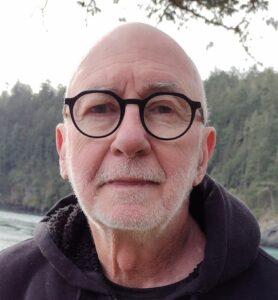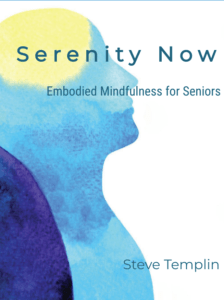Tension is a doorway to the Self for the highly sensitive person, while at the same time tension can be a preamble to pain or other chronic health complaints.
The less conscious we are of tension, say in our low back, belly, neck, jaw, or temples, the more likely it will be for tension to progress into pain or other symptoms.
The less conscious we are of tension, the less conscious we will be of the emotional experience that preceded it, the emotions that the tension is created to obscure.
Tension is a reflection of a protective autonomic nervous system (ANS) response that can lead to any variety of physical or emotional symptoms.
Tension is a call for attention from the psyche, it’s a red light blinking on the dashboard signaling that our awareness of emotional experience has a blind spot. It’s signaling that we’re disconnecting from our inner flow of feelings, of life, of Qi that truly animates and authentically guides us.
This disconnection, while clinically measured in assessments of the autonomic nervous system, is also reflected in a lack of luster coming from the eyes.
The disconnection isn’t random, it’s a protective reflex. The psyche learns to protect us from feelings that it believes we can’t handle, that are too much or overwhelming, like shame, rage, terror, or grief.
This form of protection not only successfully distances us from threatening feelings, often originating in our early childhood, but also cuts us off from the non-judgemental, present moment experience of our body, our felt source of Self.
In the extreme, we’re left disembodied, out of touch with the present moment, our bodies, our authentic Self, and from the wisdom of our heart.
In this state the mind rules, separated from the wisdom of the body and present moment awareness.
And there’s the rub, we’re protected and at the same time we’re losing our vitality, authenticity, our Self. We’re cut off from wisdom. So the dashboard lights up, the tension alarm sounds, and we have an opportunity to reclaim our Self, while at the same time very likely ameliorating pain or illness.
So What Happens When I Pay Attention to Tension?
Here’s a brief synopsis of the larger picture. Emotional energy flows through our body animating us. When the quality of that energy is threatening we suppress our experience of it to protect ourselves. A familiar manifestation of that suppressive response is an ANS imbalance and tension, which if unheeded can lead to pain and other chronic symptoms as the imbalance becomes more intense or chronic.
If tension is a signal, as I’m suggesting, then the appropriate response would be to attend to it. So what happens when I pay attention to tension? When I pay attention to the felt experience of tension, without judging it, my nervous system becomes more orderly, and more self-righting, while the ANS is rebalancing.
As I’m noticing tension consciously and non-judgmentally, as opposed to ignoring it or railing against it, energy begins to flow. With flow comes experience. I may experience memories, or feelings, or imagery that’s related to the emotion that’s been muted or suppressed.
It’s as if my system is now safely reviewing old files that had been tucked away out of sight. This review is an effort to update the system. It’s as if the emotional protection I needed as a vulnerable child is no longer necessary now that the adult in me has shown up to safely review the earlier experience.
If I can allow the review experience to unfold then sooner or later the psyche will likely begin to release the tension because it no longer serves a purpose. I’ve shown that in my adult state I can weather those feelings without harm and I no longer need to be protected.
Feeling Into Tension Non-Judgmentally
Take a breath or two and settle into your body. Take stock. Notice how you’re feeling physically and emotionally.
Now notice for any part of your body that feels tight or tense. It may be something that’s been bothering you for some time. Or, you may become aware of tension that’s been out of your awareness, hovering under your radar, but is now available to you.
Now here’s the challenging, counter-intuitive part. Make room to notice the tension curiously, and without judgment. The best way I know of shifting into non-judgement is to shift out of your head and into your body. In your body you can notice sensations or feelings that occupy three-dimensional space. For example, a tightness in your belly might be experienced as a heavy something about the size of a softball.
The shift in attention style from thinking to directly noticing sensations occupying a volume of space restores neurological order. In this more balanced state brainwaves become more orderly, left and right hemispheres communicate more efficiently, and heart-brain coherence is enhanced.
So while it’s difficult or next to impossible to ‘think’ away judgment, you can feel or sense your way into that non-judging state by learning to curiously notice your body.
When we allow attention to drop down out of the thinking head and into the sensing body significant neurological balancing occurs with the net result of more resiliency emotionally and physically.
With practice we can learn to reduce tension to resolve or prevent pain, while at the same time revealing a more true and authentic experience of who we are at our essence.


 Steve is a retired Doctor of Oriental Medicine, Acupuncture Physician, and HeartMath Trauma-Sensitive Certified Practitioner with over 35 years of clinical experience in the fields of Energy Medicine, Energy Psychology, and Biofeedback.
Steve is a retired Doctor of Oriental Medicine, Acupuncture Physician, and HeartMath Trauma-Sensitive Certified Practitioner with over 35 years of clinical experience in the fields of Energy Medicine, Energy Psychology, and Biofeedback. 